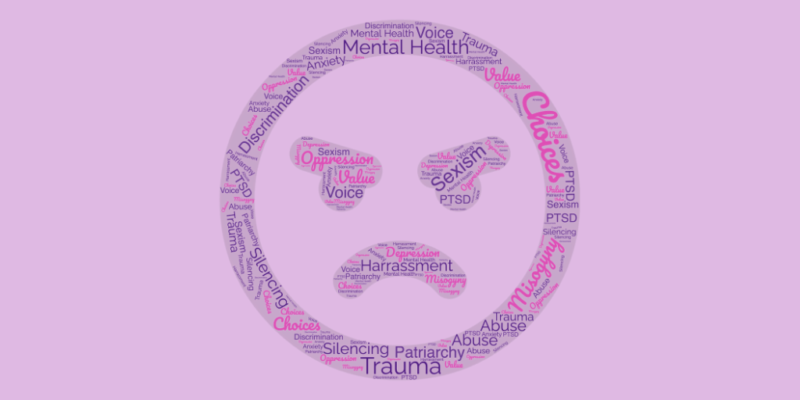Women’s mental health is negatively impacted by sexism, misogyny and gender-based discrimination. Women are approximately twice as likely to experience depression, anxiety and trauma disorders. When considering how these factors can impact a person’s well-being, this is no small difference.
Women have higher rates of depression
The Center for Disease Control’s National Center for Health Statistics published a study finding that women in the United States are almost twice as likely to have depression. Gender differences in depression are well known and this study only confirms previous research. Not only do women have double the frequency, women experience depression with greater severity than men. Social issues impact these differences.
Women have a higher incidence of anxiety and trauma disorders
A study published in the Journal of Psychiatric Research found the lifetime male:female prevalence ratios of any anxiety disorder was 1:1.7. The study also found a higher illness burden for women, making anxiety more disabling in women. It found this higher rate of diagnosis for each of the anxiety disorders examined including, generalized anxiety disorder (GAD), panic disorder (PD), agoraphobia without history of panic disorder (AG), specific phobia, and obsessive-compulsive disorder (OCD.) The study also found a higher incidence of post-traumatic stress disorder (PTSD). It did not find a difference in social anxiety disorder, however, another more recent study found that women are more likely to have social anxiety disorder (SAD) and report greater clinical severity.
Why is there a gender difference in the prevalence of these mental health diagnosis? Some studies suggest that potential biological, hormonal factors, and postpartum may be central to mental health differences.
It is becoming increasingly clear that there are many potential gendered risk factors that contribute to mental health inequities including structural inequities and the feminization of poverty. Many studies seeking answers point to factors that directly point to the impact of sexism, misogyny and gender-based inequality, discrimination and abuse including interpersonal stressors, lower self-esteem, high body shame, and higher levels of fear, trauma, childhood sexual abuse and domestic violence.
As much as our patriarchal-centered cultures would like to attribute mental health inequities to other factors, I suggest that this deflection is a denial of culpability. This opinion is supported by research. A study published by the World Health Organization World Mental Health Surveys, Archives of General Psychiatry, Cross-National Associations Between Gender and Mental Disorders in the World Health Organization World Mental Health Surveys found that these gender differences in major depression were significantly lower when cultures had less traditional gender roles. This finding was consistent across times and places. When women’s roles are more equal to those of men, women are less depressed.
The starting place for healing women from the harmful mental health impact of sexism, misogyny and gender-based discrimination is having this knowledge. We need to address these issues so that women may take back the power of their mental health.

